
If you’ve been keeping up with the latest Linux distributions, you must have noticed that 32-bit support has been dropped from most of the popular Linux distributions. Arch Linux, Ubuntu, Fedora, everyone has dropped the support for this older architecture.
But, what if you have vintage hardware with you that still needs to be revived or you want to make use of it for something? Fret not, there are still a few options left to choose from for your 32-bit system.
In this article, I’ve tried to compile some of the best Linux distributions that will keep on supporting 32-bit platform for next few years.
This list differs from our earlier list of Linux distributions for old laptops. Even 64-bit computers can be considered old if they were released before 2010. This is why some suggestions included distros that only support 64-bit now.
The information presented here is correct as per my knowledge and findings, but if you find otherwise, please let me know in the comment section.
Before you go on, I suppose you know how to check if you have a 32 bit or 64 bit computer.
1. Debian
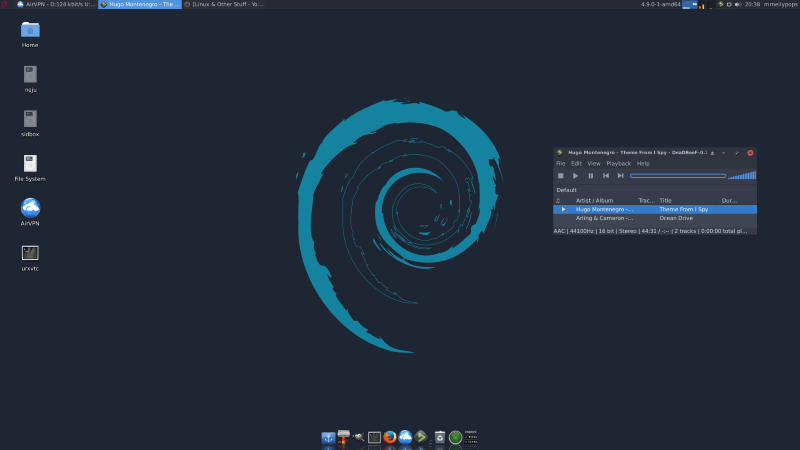
Debian is a fantastic choice for 32-bit systems because they still support it with their latest stable release. At the time of writing this, the latest stable release Debian 11 “bullseye” offers a 32-bit version and is supported until 2026.
If you’re new to Debian, it is worth mentioning that you get solid documentation for everything on their official wiki. So, it shouldn’t be an issue to get started.
You can browse through the available installers to get it installed. However, before you proceed, I would recommend referring to the list of things to remember before installing Debian in addition to its installation manual.
Minimum System Requirements:
- 512 MB RAM
- 10 GB Disk Space
- 1 GHz Processor (Pentium 4 or equivalent)
2. Slax

If you just want to quickly boot up a device for some temporary work, Slax is an impressive option.
Although there are separate Slackware and Debian-based releases, the 32-bit variant of Slax is available with Debian at its core. It aims to be a portable and fast option that is meant to be run through USB devices or DVDs. You can download the 32-bit ISO file from their website or purchase a rewritable DVD/encrypted pen drive with Slax pre-installed.
Of course, this isn’t meant to replace a traditional desktop operating system. But, yes, you do get the 32-bit support with Debian as its base.
Minimum System Requirements:
- RAM: 128 MB (offline usage) / 512 MB (for web browser usage)
- CPU: i686 or newer
3. AntiX
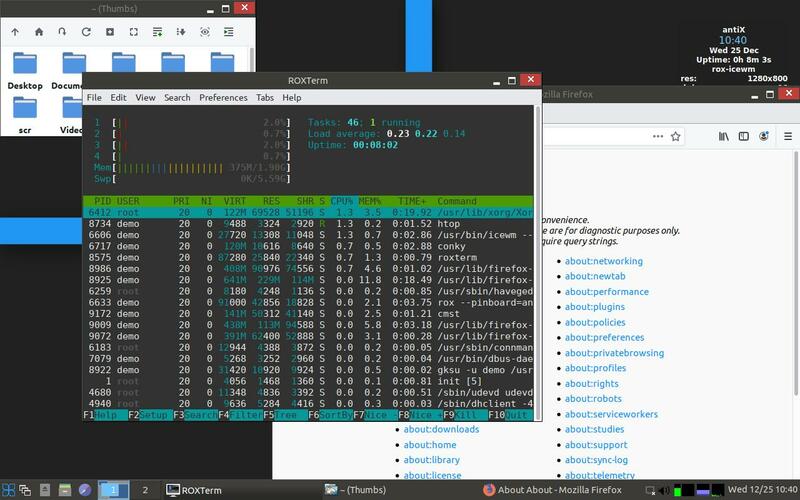
Yet another impressive Debian-based distribution. AntiX is popularly known as a systemd-free distribution that focuses on performance while being a lightweight installation.
It is perfectly suitable for just about any old 32-bit system. To give you an idea, it just needs 256 MB RAM and 2.7 GB storage space at the very least. Not just easy to install, but the user experience is focused on both newbies and experienced users.
You should get the latest version based on Debian’s latest stable branch available.
Minimum System Requirements:
- RAM: 256 MB of RAM
- CPU: PIII systems
- Disk space: 5 GB of drive space
4. openSUSE
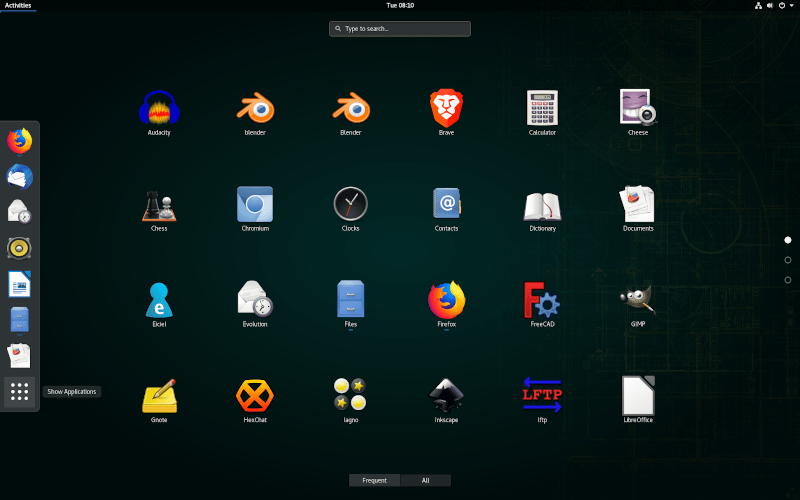
openSUSE is an independent Linux distribution that supports 32-bit systems as well. Even though the latest regular version (Leap) does not offer 32-bit images, the rolling release edition (Tumbleweed) does provide 32-bit image.
It will be an entirely different experience if you’re new. However, I suggest you to go through the reasons why you should be using openSUSE.
It is mostly focused for developers and system administrators but you can utilize it as an average desktop user as well. It is worth noting that openSUSE is not meant to run on vintage hardware — so you have to make sure that you have at least 2 GB RAM, 40+ GB storage space, and a dual-core processor.
Minimum System Requirements:
- Pentium 4 1.6 GHz or higher processor
- 1 GB physical RAM (at least 1.5 GB when using online repos, 2 GB recommended)
- 10 GB Hard Disk for a minimal install, 16 GB available for a graphical desktop (40 GB or more recommended)
5. Emmabuntüs
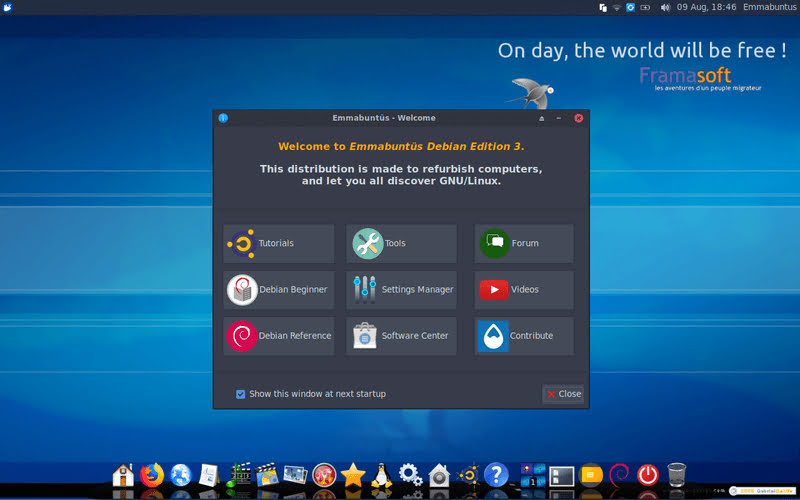
Emmabuntus is an interesting distribution that aims to extend the life of the hardware to reduce the waste of raw materials with 32-bit support. As a group they’re also involved in providing computers and digital technologies to schools.
It offers two different editions, one based on Ubuntu and the other based on Debian. If you want longer 32-bit support, you may want to go with the Debian edition. It may not be the best option, but with a number of pre-configured software to make the Linux learning experience easy and 32-bit support, it is a decent option if you want to support their cause in the process.
Minimum System Requirements:
- 512 MB RAM
- Hard Drive: 80GB for comfortable use
- Pentium 4 processor or equivalent and Dual Core
6. NixOS

NixOS is yet another independent Linux distribution that supports 32-bit systems. It focuses on providing a reliable system where packages are isolated from each other.
This may not be directly geared towards average users but it is a KDE-powered usable distribution with a unique approach to package management. You can learn more about its features from its official website.
Minimum System Requirements:
- RAM: 768 MB
- 8 GB Disk Space
- Pentium 4 or equivalent
7. Gentoo Linux
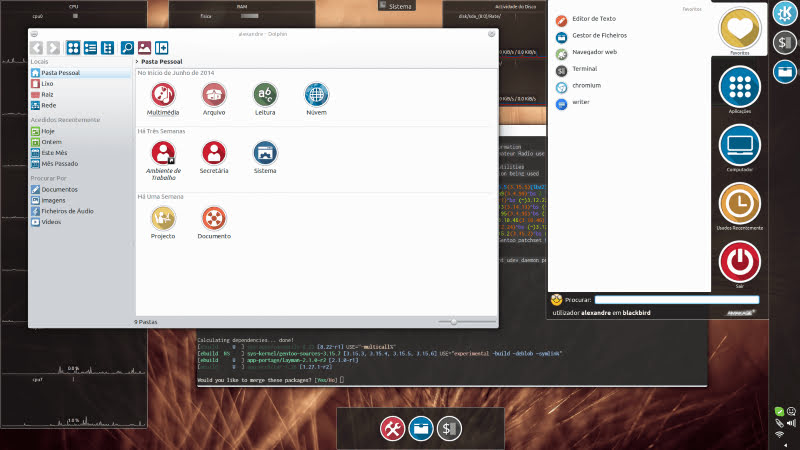
If you’re an experienced Linux user and looking for a 32-bit Linux distributions, Gentoo Linux should be a great choice.
You can easily configure, compile, and install a kernel through package manager with Gentoo Linux if you want. Not just limited to its configurability, which it is popularly known for, you will also be able to run it without any issues on older hardware.
Even if you’re not an experienced user and want to give it a try, simply read through the installation instructions and you will be in for an adventure.
Minimum System Requirements:
- 256 MB RAM
- Pentium 4 or AMD equivalent
- 2.5 GB Disk Space
8. Devuan
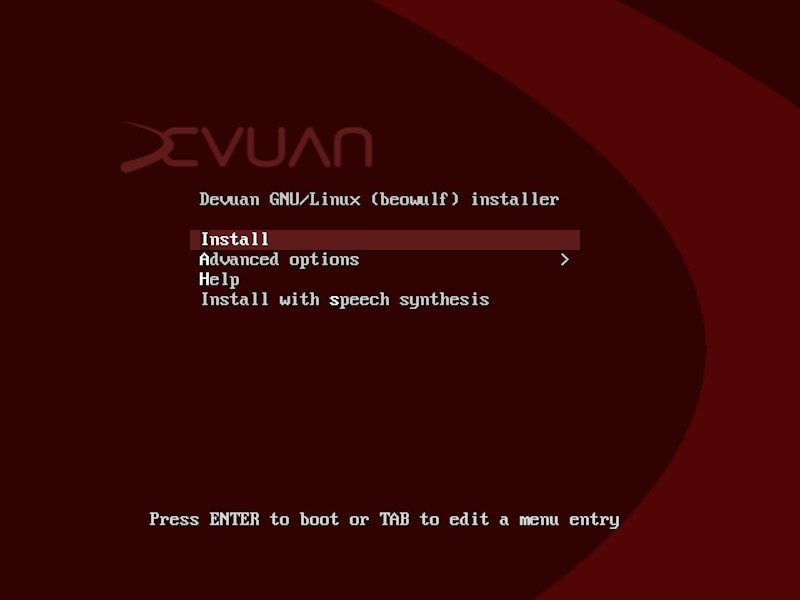
Devuan is yet another systemd-free distribution. It is technically a fork of Debian, just without systemd and encouraging Init freedom.
It may not be a very popular Linux distribution for an average user but if you want a systemd-free distribution and 32-bit support, Devuan should be a good option.
Minimum System Requirements:
- RAM: 1 GB
- CPU: Pentium 1.0 GHz
9. Void Linux

Void Linux is an interesting distribution independently developed by volunteers. It aims to be a general-purpose OS while offering a stable rolling release cycle. It features runit as the init system instead of systemd and gives you the option of several desktop environments.
It has an extremely impressive minimum requirement specification with just 96 MB of RAM paired up with Pentium 4 (or equivalent) chip. Try it out!
Minimum System Requirements:
- 96 MB RAM
- Pentium 4 or AMD equivalent processor
- Void is not available for the older 32-bit architectures like i386, i486, or i586
10. Q4OS
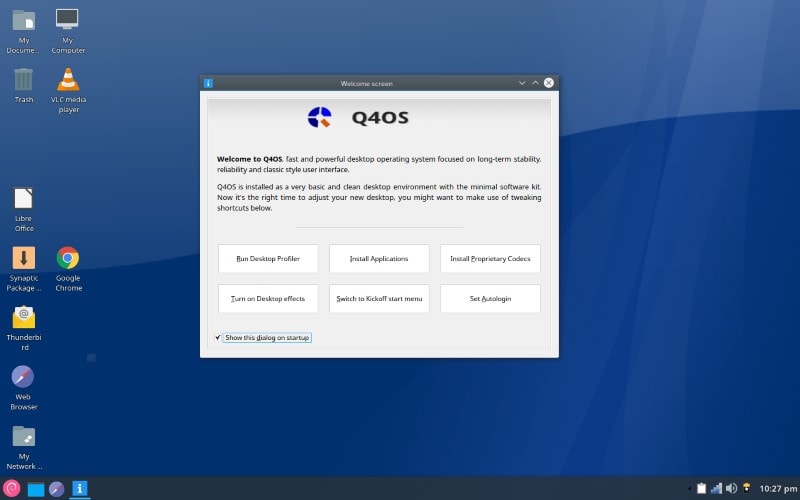
Q4OS is another Debian-based distribution that focuses on providing a minimal and fast desktop user experience. It also happens to be one of the best lightweight Linux distributions in our list. It features the Trinity desktop for its 32-bit edition and you can find KDE Plasma support on 64-bit version.
Similar to Void Linux, Q4OS also runs on a bare minimum of at least 256 MB RAM and a 300 MHz CPU with a 3 GB storage space requirement. It should be more than enough for any vintage hardware. So, I’d say you should definitely try it out!
To learn more about it, you can also check out our review of Q4OS.
Minimum Requirements for Q4OS:
- RAM: 256 MB (Trinity Desktop) / 1 GB (Plasma Desktop)
- CPU: 300 MHz (Trinity Desktop) / 1 GHz (Plasma Desktop)
- Storage Space: 5 GB (Plasma Desktop) / 3 GB (Trinity Desktop)
11: MX Linux
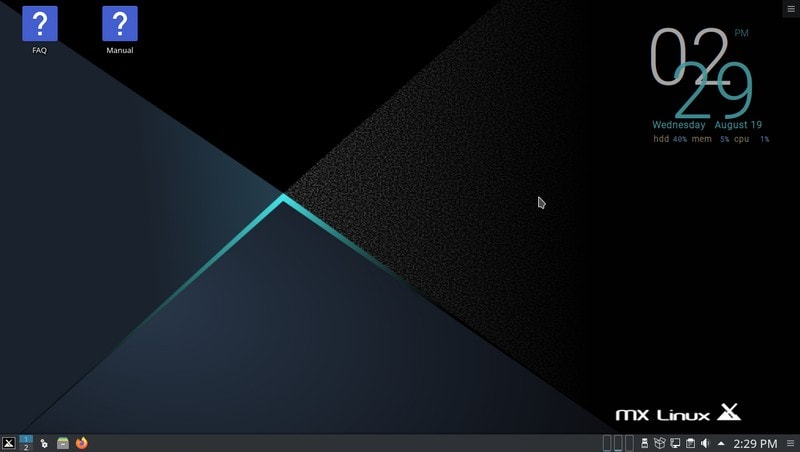
If you’ve got a slightly decent configuration (not completely vintage but old), MX Linux would be my personal recommendation for 32-bit systems. It also happens to be one of the best Linux distributions for every type of user.
In general, MX Linux is a fantastic lightweight and customizable distribution based on Debian. You get the option to choose from KDE, XFCE or Fluxbox (which is their own desktop environment for older hardware). You can explore more about it on their official website and give it a try.
Minimum System Requirements:
- 1 GB RAM (2 GB recommended for comfortable usage)
- 15 GB of disk space (20 GB recommended).
12. Linux Mint Debian Edition
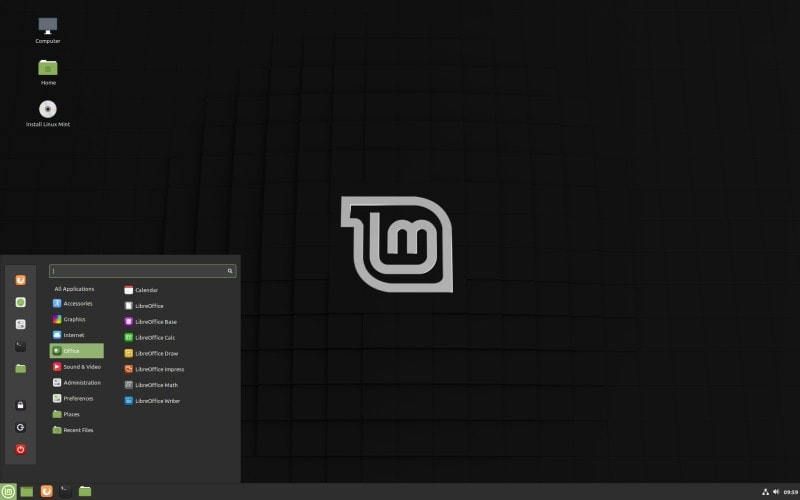
Linux Mint based on Debian? Why not?
You get the same Cinnamon desktop experience just without Ubuntu as its base. It is equally easy to use and as reliable as Linux Mint based on Ubuntu.
Not just limited to the Debian base, but you get support for both 64-bit and 32-bit systems. This should be a great choice if you do not want to use a Linux distribution that you’ve never heard on your 32-bit system.
Minimum System Requirements:
- 1 GB RAM (2 GB recommended for comfortable usage)
- 15 GB of disk space (20 GB recommended)
13. Sparky Linux

Sparky Linux is one of the best lightweight Linux distributions tailored for beginners. It is easily customizable and light on resources.
It offers different editions as per your requirements but it does support 32-bit versions. Considering that you want something for your old computer, I would recommend taking a look at its MinimalGUI edition unless you really need a full-fledged desktop environment like Xfce or LXQt.
Minimum System Requirements:
- RAM: 128MB (CLI Edition), 256MB (LXDE, LXQt, Openbox) or 512MB (XFCE)
- CPU: Pentium 4, or AMD Athlon
- Disk space: 2 GB (CLI Edition), 10 GB (Home Edition), 20 GB (GameOver Edition)
14. Mageia

A fork of Mandriva Linux, Mageia Linux is a community-powered Linux distribution that supports 32-bit systems.
Usually, you will notice a major release every year. They aim to contribute their work to provide a free operating system that is also potentially secure. It may not be a popular choice for 32-bit systems but it supports a lot of desktop environments (like KDE Plasma, GNOME); you just need to install it from its repositories if you need.
You should get the option to download a desktop environment-specific image from their official site.
Minimum System Requirements:
- 512 MB RAM (2 GB Recommended)
- 5 GB storage space for minimal installation (20 GB for regular installation)
- CPU: Pentium 4, or AMD Athlon
15. Alpine Linux

Alpine Linux is extremely popular among Docker users because it provides a minimal container image of just 5 MB in size.
Although its desktop version is nowhere as small as 5 MB, it is still a pretty decent desktop Linux distro.
There are several release branches for Alpine Linux. Usually, you will get 2-year support for the main repository and support until the next stable release for the community repository. Moreover, it offers several variants, including 32-bit systems.
Since it is made around musl libc and busybox with resource-efficient containers, a minimal installation to disk requires around 130 MB of storage (for server edition). Also, you get a full-fledged Linux Environment together with a huge collection of packages in repository.
Minimum System Requirements
- RAM: 128MB (To start), 256MB (to install), 1GB (for GUI)
- At least 700 MB space on a writable storage device.
Honorable Mentions: Funtoo & Puppy Linux
Funtoo is a Gentoo-based community-developed Linux distribution. It focuses on giving you the best performance with Gentoo Linux and some extra packages to complete the experience for users. It is also interesting to note that the development is actually led by Gentoo Linux’s creator Daniel Robbins.
Puppy Linux is a tiny Linux distro with almost no bundled software applications but basic tools. Puppy Linux could be an option if nothing else works and you want the lightest distro.
Of course, if you’re new to Linux, you may not have the best experience with these options. But, both the distros support 32-bit systems and work well across many older Intel/AMD chipsets. Explore more about it on their official websites to explore.
Wrapping Up
I focused the list on Debian-based and some Independent distributions. However, if you don’t mind long-term support and just want to get your hands on a 32-bit supported image, you can try any Ubuntu 18.04 based distributions as well.
At the time of writing this, they just have a few more months of software support left. Hence, I avoided mentioning it as primary options. But, if you like Ubuntu 18.04 based distros or any of its flavours, you do have options like LXLE, Zorin Lite 15 (ZorinOS 15.3 has 32-bit version supported until April 2023).
Even though most modern desktop operating systems based on Ubuntu have dropped support for 32-bit support, you still have plenty of choices to go with.
What would you prefer to have on your 32-bit system? Let me know your thoughts in the comments below.

